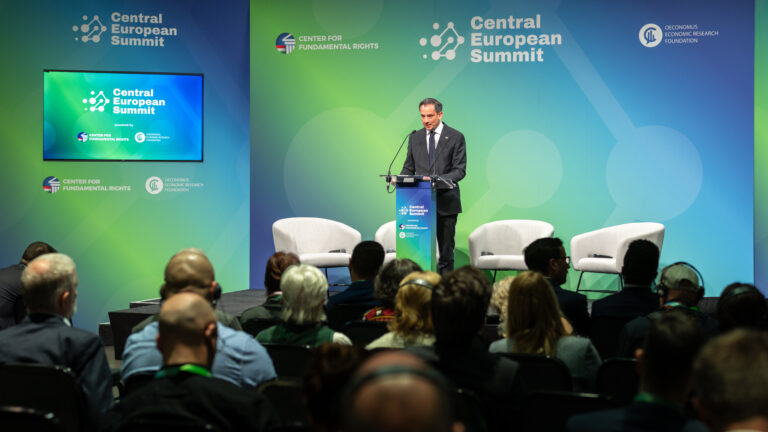Natalism is sweeping the globe, from conferences to headlines. It’s a wake-up call: our future hinges on families, not just individuals. America must act, incentivizing births within intact, married households to rebuild a stable, prosperous society for all in a post-liberal age.
Last month the Danube Institute’s Family Formation and the Future conference in Budapest brought together scholars and policymakers to wrestle with the cultural, legal, and geopolitical stakes of shrinking populations, placing family policy front and center. On this side of the Atlantic, the recent Natal Conference in Austin rallied thinkers against a birth rate that sank to 1.66 in 2024. Closer to the public eye, Trump advisor Elon Musk cheers births by happily lugging his toddler from White House meetings to SpaceX launch pads, a welcome push, though his serial baby daddy status reminds us our goal should be intact families, not just more babies. How do we make that happen?
What’s Post-Liberal?
This growing momentum isn’t random. It reflects a zeitgeist yearning for roots, and post-liberalism captures that spirit of the age. It marks a break from radical individualism, where personal choice once ruled with scant regard for collective fallout. Now, it weaves individual rights with duties to the common good, answering a cultural hunger for connection over isolation.
‘Natalism’ here isn’t about raw population spikes or state overreach. It means targeted incentives, like tax credits or loan forgiveness, to boost births within intact, married households. An ‘intact family’ is a mother and father raising children together, a setup consistently linked to lower poverty and crime, among myriad benefits.
The Crisis We Face
Data is flooding in, and it’s clear: we’re in a slow-motion disaster. Birth rates crashed after the 2008 recession, dropping to 1.7 per woman, far below the 2.1 needed to sustain a population without immigration. Zoom in, and only 62 per cent of Millennials grew up with both parents, a steep fall from 87 per cent of Silents decades ago. Worse still, 80 per cent of childless women wanted kids but missed out, stuck without partners or misled by time.
Culture shifted too, with marriage now a ‘capstone’ prize chased after degrees, not a life’s cornerstone. Then there’s the fallout: 40 per cent of kids are born out of wedlock, and fatherless boys are twice as likely to drop out of school. Add this twist: women now outnumber men in college 3 to 2, leaving a shrinking pool of ‘marriageable’ mates for those seeking partners with education parity.
A Plan That Works
We can turn this around with deliberate policies. Expand the Child Tax Credit to $4,500 per child, fully refundable and permanent, a move that could lift 2 million kids out of poverty. Perhaps we could borrow from Hungary’s playbook with a $33,000 marriage loan, forgiven upon a third child’s birth. In March 2025 Hungary granted women with two or more children lifetime income tax exemptions, impacting 600,000 mothers and raising family incomes by 15 per cent.
Another tie in is to address education and the boy crisis—boys underperforming girls at alarming rates—with parent-controlled vouchers. Florida’s 2023 law under Governor Ron DeSantis offers every family $8,000 for private tuition, homeschooling, or savings accounts up to $24,000, boosting private school enrollment by 15 per cent, state records show. Fund it by closing the Department of Education, redirecting its $80 billion budget to families.
Everybody Wins
I can already hear America’s singles and childless couples balking, but the payoff isn’t just for parents. Children from intact families are 82 per cent less likely to live in poverty, reducing welfare costs for everyone. Our low fertility rate–well below replacement levels–risks a 30 per cent Social Security shortfall by 2050, but reaching 2.1 could add $1.5 trillion to GDP annually. Businesses benefit from stable workers, with Hungary’s family incentives cutting turnover by 20 per cent. Singles gain as boy-crisis fixes produce educated men, meeting the 60 per cent of women seeking such partners. Taxpayers win with a 10 per cent workforce increase, countering an existential 36 per cent loneliness epidemic sweeping the nation.
Facing Fiscal Critics
Critics spotlight costs, noting Florida’s $4 billion voucher tab or Hungary’s 170 billion forint ($441 million) tax break. Yet the Department of Education’s $80 billion budget more than covers this, especially if Trump’s Department of Government Efficiency (DOGE) slashes it—say, by half—, freeing $40 billion. That cash, funneled to families, gets reinvested fast. Studies show low-income families spend 90 per cent of aid on essentials, juicing local economies and yielding GDP gains—like the $1.5 trillion bump from hitting 2.1 fertility. Others argue incentives erode liberty, but they’re optional, not mandates, unlike a status quo leaving 25 per cent of Millennials childless against their will. DOGE savings could seed this shift, proving fiscal hawks wrong with growth, not debt.
I’m no nostalgist, a piner for the past. What I’m advocating for is philosopher Edmund Burke’s timeless wisdom reborn. Society thrives as a partnership across generations, with intact families of mothers and fathers raising children as its cornerstone. Post-liberalism taps this spirit and spurns individualism’s drift for a natalism that rebuilds us all. Data screams crisis; incentives like tax credits and vouchers answer it. Stable households lift parents and bolster taxpayers, businesses, and singles with growth and connection. Hungary’s incentives and Florida’s successes offer a starting point. This pact renews America’s strength, rooted yet forward-looking. If we act now, America can thrive for years to come.
Related articles:








